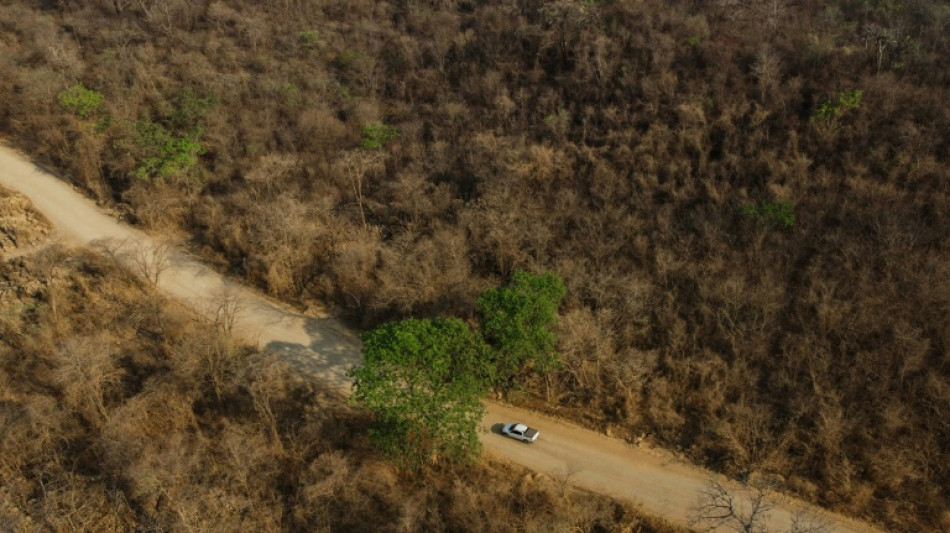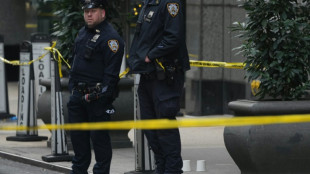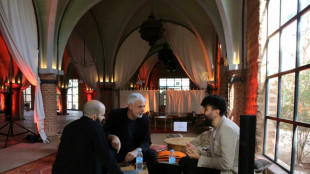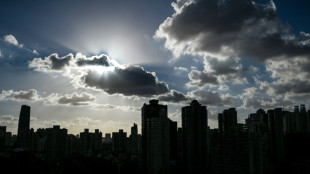
-
 Warhammer maker Games Workshop enters London's top stocks index
Warhammer maker Games Workshop enters London's top stocks index
-
Iran Nobel winner released for three weeks, 'unconditional' freedom urged

-
 Red Cross marks record numbers of humanitarians killed in 2024
Red Cross marks record numbers of humanitarians killed in 2024
-
Johnson's Grand Slam 'no threat', says World Athletics boss Coe

-
 Qatar's emir and UK's Starmer talk trade as state visit ends
Qatar's emir and UK's Starmer talk trade as state visit ends
-
Cuba suffers third nationwide blackout in two months

-
 Russia, Ukraine to send top diplomats to OSCE summit in Malta
Russia, Ukraine to send top diplomats to OSCE summit in Malta
-
Spanish royals to attend memorial service for flood victims

-
 LPGA, USGA new policy requires female at birth or pre-puberty change
LPGA, USGA new policy requires female at birth or pre-puberty change
-
Stick to current climate change laws, US tells top UN court

-
 British Museum chief says Marbles deal with Greece 'some distance' away
British Museum chief says Marbles deal with Greece 'some distance' away
-
Pope Francis receives electric popemobile from Mercedes

-
 Gaza civil defence: thousands flee Israeli strikes, evacuation calls
Gaza civil defence: thousands flee Israeli strikes, evacuation calls
-
Trump names billionaire private astronaut as next NASA chief

-
 Pidcock to leave INEOS Grenadiers at end of season
Pidcock to leave INEOS Grenadiers at end of season
-
Seoul stocks weaken, Paris advances despite political turmoil

-
 South America summit hopes to seal 'historic' trade deal with EU
South America summit hopes to seal 'historic' trade deal with EU
-
DAZN awarded global TV rights for Club World Cup

-
 Top executive shot dead outside New York hotel
Top executive shot dead outside New York hotel
-
Vaping while still smoking unlikely to help quitters: study

-
 British Museum chief says Parthenon Marbles deal with Greece 'some distance' away
British Museum chief says Parthenon Marbles deal with Greece 'some distance' away
-
'Creating connections': Arab, African filmmakers gather at Morocco workshops

-
 Iran frees Nobel winner for three weeks, sparking calls for 'permanent' release
Iran frees Nobel winner for three weeks, sparking calls for 'permanent' release
-
Brazil's Minas cheese gets added to UNESCO list

-
 Top US executive shot dead in New York City: media
Top US executive shot dead in New York City: media
-
Trump's nominee to run Pentagon hangs by a thread

-
 GM announces more than $5 bn hit to earnings in China venture
GM announces more than $5 bn hit to earnings in China venture
-
World chess champ Ding, teen challenger tied past halfway mark

-
 Georgia police raid opposition offices as PM vows to curb protests
Georgia police raid opposition offices as PM vows to curb protests
-
S. Korea opposition begins push to impeach president

-
 Syrian army fights rebel offensive with counterattack
Syrian army fights rebel offensive with counterattack
-
France court upholds Polanski acquittal in defamation case

-
 UK bans daytime TV ads for cereals, muffins and burgers
UK bans daytime TV ads for cereals, muffins and burgers
-
Palace's Guehi to face no formal action over 'Jesus' message on rainbow armband

-
 UK faces trade balancing act with Trump, EU
UK faces trade balancing act with Trump, EU
-
Iran releases Nobel Peace laureate Mohammadi on medical leave: lawyer

-
 UNESCO grants heritage status to Aleppo soap as Syria war flares
UNESCO grants heritage status to Aleppo soap as Syria war flares
-
Ghana's illegal mining boom seeps into presidential election

-
 Inconsistent Spurs 'progressing in all aspects': Postecoglou
Inconsistent Spurs 'progressing in all aspects': Postecoglou
-
France's Orano says Niger junta controls uranium firm

-
 Seoul stocks weaken, Paris edges up tracking political turmoil
Seoul stocks weaken, Paris edges up tracking political turmoil
-
China reports warmest autumn since records began

-
 French marine park to close over law banning killer whale shows
French marine park to close over law banning killer whale shows
-
Thousands march demanding S. Korea president resign over martial law debacle

-
 Taiwan romance novelist Chiung Yao dies at 86
Taiwan romance novelist Chiung Yao dies at 86
-
In Angola, Biden promises to invest differently to China

-
 Syrian army launches counteroffensive against rebels
Syrian army launches counteroffensive against rebels
-
Evenepoel says 'long journey' ahead after postal van collision

-
 South Korea's day of rage as Yoon's martial law founders
South Korea's day of rage as Yoon's martial law founders
-
UK police question killer nurse Letby over further baby deaths

| RYCEF | 1.46% | 7.55 | $ | |
| RBGPF | -1.64% | 61 | $ | |
| CMSC | 0.15% | 24.596 | $ | |
| NGG | -1.19% | 62.23 | $ | |
| BCC | -0.49% | 145.72 | $ | |
| SCS | -0.71% | 13.425 | $ | |
| RIO | -0.12% | 63.435 | $ | |
| AZN | -2.29% | 66.525 | $ | |
| RELX | 0.88% | 47.902 | $ | |
| GSK | -1.06% | 34.535 | $ | |
| VOD | -0.4% | 8.795 | $ | |
| JRI | -0.59% | 13.46 | $ | |
| BCE | -1.81% | 26.825 | $ | |
| CMSD | 0.16% | 24.35 | $ | |
| BTI | 0.42% | 37.185 | $ | |
| BP | -1.25% | 29.085 | $ |

Green shoots spring from ashes in Brazil's fire-resistant savanna
The huge wildfires that ripped through Brazil recently did not spare its vast tropical savanna, but green shoots are already emerging from the ashes there, proof of the vast grasslands' rare gift for fire resistance.
The Cerrado, the most species-rich savanna in the world, covers some two million square kilometers of land (770,000 square miles) in central Brazil -- nearly one-fifth of the country's entire surface area.
In Brasilia National Park, on the outskirts of the nation's capital, blackened soil and charred tree trunks stand testimony to the ferocity of a fire that ripped through 1,470 hectares (3,600 acres) of land in September.
Brazil was then in the throes of a record drought -- the city of Brasilia had gone 169 days without a drop of rain -- which lit the torch under the worst wildfire season in over a decade, blamed by experts at least partly on climate change.
But the Cerrado, which is less well-known than the neighboring Amazon and Pantanal wetlands, has a superpower: over millions of years, it has developed some resistance to flames and high temperatures.
- Upside-down forest -
"The Cerrado is an inverted forest. We see only a fraction of it because the forest is all under our feet," said Keiko Pellizzaro, an environmental analyst at the Chico Mendes Institute for Biodiversity Conservation, a government agency.
The Cerrado's deep root system acts like a "pump," sucking up groundwater "even during extreme drought," she said.
Meanwhile, above ground the trees' thick bark and the shells of the fruit act as "thermal insulators," said Isabel Schmidt, professor of ecology at the University of Brasilia.
Even if temperatures reach up to 800 centigrade (1,470 Fahrenheit), the vegetation can survive "as if it were just another hot day," she said.
A month after the recent fires, the first rains saw grass and small plants quickly beginning to grow, and new leaves sprouted on charred trees in Brasilia National Park.
"Even if it hadn't rained, we would have seen some resilience," Pellizzaro said.
"I'm amazed by its capacity for regeneration," said Priscila Erthal Risi, a 48-year-old volunteer who took part in an operation by the Chico Mendes Institute to replant the reserve with native species such as donkey's tail and Magonia pubescens trees.
- Tested to the limit -
Brazilian police are still investigating the cause of the fire in Brasilia National Park.
Most wildfires in Brazil are started by farmers or agribusiness workers to clear land for cattle grazing or crops.
Schmidt said the Cerrado's vegetation had always survived sporadic fires caused by lightning strikes during the rainy season.
But she warned that if extreme droughts become more frequent the biome's resilience could be tested.
"The resistance that plants and animals have to any type of fire was developed over millions of years, but climate change has taken place in a matter of decades. No organism can adapt that quickly," she said.
- 'Cradle of waters' at risk -
The Cerrado is crucial not only for the survival of the thousands of species that call it home but for the water supply of a large part of South America.
The so-called "cradle of waters" is home to the sources of some of the continent's biggest rivers and aquifers.
But its role as a continental spring is endangered.
With the rainy season starting later and later each year and the amount of rain declining by eight percent on average over the past three decades, the flow of the Cerrado's rivers has fallen by 15 percent.
If wildfires become more frequent, Schmidt warned, "many ecosystems that are more vulnerable to fire," including in the Cerrado, "will simply not survive."
B.Shevchenko--BTB


